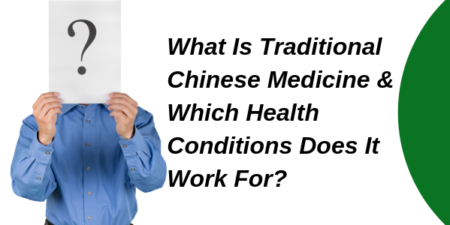What Is Traditional Chinese Medicine & Which Health Conditions Does It Work For?

For thousands of years, long before mass migration and instant-messaging, every culture and society worldwide developed and relied on its own traditions, local flora and fauna to sustain and benefit the health of its community. Many of those healing traditions remain in use today around the world. Sometimes it appears as sage advice: don’t walk barefoot on a cold floor; and other times it’s a family’s herbal tea recipe for sore throat: marshmallow root, sage and echinacea.
Chief among today’s most well-known forms of early healing is Traditional Chinese Medicine (TCM), which focusses on use of herbal medicine, acupuncture, massage (tuina), exercise (qigong), and dietary (food) therapy to prevent illness and maintain health.
Although, TCM originated in China about 2500 years ago and the earliest known documents written on Chinese Medicine date back to 150 BC, it should not be considered primitive or irrelevant to modern healthcare. Chinese Medicine is a complete healing system that reflects the insights and knowledge of a time when healthcare addressed the whole person — mind, body and spirit — emphasizing preventive practices and overall wellness, much like modern holistic therapies do today.
Like other medical disciplines, TCM encompasses a broad range of practices, specialties, and diagnostic and treatment approaches.
Herbology for example is an integral part of TCM, in much the same way that pharmacology is an essential component of modern western medicine — perhaps the most notable difference being that many of the classic herbals were developed over a thousand years ago and have been safely and effectively prescribed for centuries.
One of the challenges to embracing traditional medicine for modern societies is resisting the wholesale appeal to novelty – “newer is better.” I think everyone might agree that in many instances that expression holds-up, but not in all things – and especially not when the risks outweigh the benefits.
In TCM, the analysis of a patient’s health complaint begins with an investigation and understanding of what changes in anatomy, physiology and pathology might be involved. What’s wrong and why? Chinese medicine considers the body to be a self-regulating system. I’m confident that most of us have experienced and recognize the miracle of healing and transformation the body undergoes when recovering from an illness or trauma.
Whether it is the body’s thermal regulation used to induce fever during an infection or bone formation to repair a fracture, our bodies are hardwired with wonderous strategies for maintenance and repair. So too, in Chinese Medicine the role of herbs, acupuncture, massage, exercise, and food are chosen to support and promote the body’s own self-healing ability.
Which health issues and conditions can be treated with Traditional Chinese medicine?
In Florida, Licensed Acupuncturists provide care to address many of the same maladies for which patients seek treatment from a medical doctor or specialist. This includes care for headaches to hammertoes, and most things in between. But the vast majority of patients receiving routine care from Acupuncturists are being treated for pain related complaints. Rarely is there just one best treatment for any health complaint – so, patients should be well-informed about their alternatives.
Fortunately, most often less-is-more, and so too that can be said for patient-care with otherwise healthy people. But when it’s not, and more care or expertise is needed, a well-trained licensed Acupuncturist understands and respects his/her role in the healthcare delivery model; and they will provide patients with an appropriate referral to a medical doctor for any condition needing emergency or other expert care. Lots of licensed specialty healthcare providers live and work in Citrus County. Most will welcome a phone call or visit to learn more about their practice. Get to know them and learn more about your healthcare alternatives.
 Alternative Primary Care
Alternative Primary Care